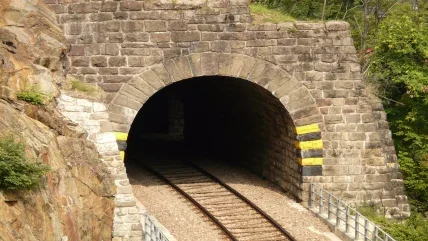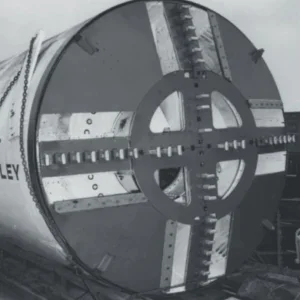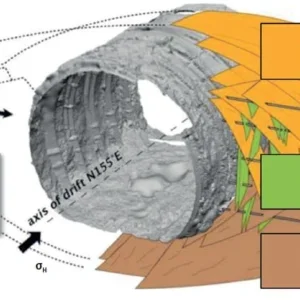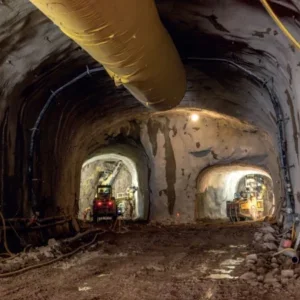
The International Tunnelling and Underground Space Association (ITA) is consolidating itself as the world’s leading voice of all things underground.
The new Executive Council (ExCo), elected last year (September 2022), has accelerated its mission of change to embrace the challenges of this point in human history – such as the climate emergency, intensive urbanisation, environmental problems, economic efficiencies, equity, inclusion, and the challenges of delivering a better world for all of our peoples.
Prior to my election I distributed a Policy Statement to the Member Nations that outlined my policy positions for ITA and the various initiatives I proposed to implement, if elected. In only 12 months since that election, myself in combination with a newly elected Executive Council, have made significant progress.
OUTREACH AND CONNECTION
My Presidency comes at a critical point in the history of both ITA and the peoples we serve across the world.
Following my election, I did not return home for four months – immediately focusing on re-establishing trusted friendly relations between ITA and other organisations and entities post the disruptions caused by the Covid pandemic and lockdowns.
In addition, I knocked on many new doors, reaching out to our associates in banking, finance, law, roads, water, sewerage, energy, waste – looking for opportunities to make more relevant the ITA and accelerate our various co-operations. After a brief break, for an Australian Christmas, I again hit the road for another seven months of door knocking and advocacy of the ITA.
The results speak for themselves. ITA now has new active collaborations with BRE, NEC, World Bank, International Road Federation (IRF), and the International Atomic Energy Agency (IAEA). Our links with long standing sister organisations have been bolstered by our attendances at their meetings, including PIARC (World Road Association) and the IRF as well as meetings of our accredited Member Nation organisations in Turkey, India, and Australia.
We also look actively for opportunities and occasions to give and support positive and inclusive messages of a friendly ITA, helping the pursuit of a better life for all our peoples and planet. At the most recent WTC, in Athens in May this year, we joined with an international cricket match at a local primary school. Hundreds of children, cheering on players from around the world, created an atmosphere of inclusivity, purpose, and fun.
LEADERSHIP ELECTIONS
WTC 2023 in Athens was also an occasion for more change at ITA, including appointment of our new Executive Director, Roland Herr, to lead the Secretariat. He has been joined by his new Executive Secretary, Christiane Linkenbach.
Elections have been held in all ITA Working Groups and Committees, setting a new precedent for open and regular elections for all roles within our organisation.
The issue of elections has been ambiguous in the past. As part of the governance reforms, the new ExCo has agreed for the ‘One ITA’ policy to include provision for leadership elections every three years. The new energised ITA needs these regular elections to maintain momentum and energy.
ITACET Foundation is independent and since I was elected it, too, has had elections in accordance with the One ITA policy and further performance improvements are being encouraged.
We are urgently seeking new funding mechanisms to promote the education agenda.
MEASURES AND METRICS
The global sustainability crisis – which is linked to the climate emergency and other worrying global trends – has highlighted the importance of transparent means of measuring the performance of underground spaces. In the absence of such tools the underground is exposed to great risk of being misunderstood and the benefits of using the underground lost in the noise of the uninformed and uneducated popular narratives.
The world needs underground solutions for its water, sewerage, environmental protection, transport, energy storage, wastes storage, energy production, and security needs.
Responding to the climate emergency and the lack of objective sustainability assessment tools for the underground, a new special purpose sustainability committee has been formed which directly reports to the ExCo and has deliverables due by WTC 2024, to be hosted in Shenzhen, China (April 2024).
The special purpose committee is tasked with delivering the first underground specific guidance document for projects aimed at empowering clients to deliver better projects from a sustainability perspective in accordance with the current United Nations (UN) priorities.
This overarching committee is headed by Tommy Olsen and comprises members drawn from all Working Groups and Member Nations on an opt-in basis. To achieve this stretch target of deliverables with little more than half a year to go now, the Committee is divided into 4 groups, each with tasks, as follows:
- Task A – an underground specific BREEAM module, the work headed by Goetz Vollmann;
- Task B – Optioneering for superior project choices, headed by Giuseppe Gaspari;
- Task C – An overview of current international sustainability rating frameworks, headed by Nikolai Bobylev; and,
- Task D – Equity, Diversion and Inclusion tools to deliver social and economic benefits, headed by Nasri Munfah
The special purpose committee on sustainability that reports directly to me and the Executive Council and is also working with experts from external organisations such as BRE, and NEC, as well as other organisations globally. These external stakeholders have agreed to work with the ITA to produce the world’s first underground specific sustainability indexing tools, guidelines, optioneering frameworks, and social indexing tools.
I hold regular meetings with the heads of the other organisations to discuss progress and ensure there are no roadblocks. Our next heads meeting will be in London in September
All four outputs will be coordinated into a central advisory publication for clients and the global underground industry. It is anticipated that this publication will form the framework for future elaborations on this increasingly critical subject.
In the short term, we expect the guidelines to be produced in 2024 – by WTC in China – and that they will be ready for inclusion in existing tools used by the tunnelling industry, such as conditions of contracts and indexing tools like BREEAM.
In combination, we expect these to constitute the world’s first guide for clients on how they can actually select and implement the ‘best’ overall project options from a UN Sustainable Development Goals (SDG) perspective and not have choices left to be simply about lowest cost.
MORE COLLABORATIONS AND OUTREACH
The relevance of the ITA is being further strengthened with new initiatives and more collaborations with external bodies.
In addition to those mentioned earlier such as the World Bank, PIARC and IAEA, we have new collaborations with: the International Commission on Large Dams (ICOLD), the European Centre for Nuclear Research (CERN), the National Fire Protection Association USA (NFPA), the International Water Federation (IWF), the International Road Federation and International Road Federation Global, and the Associated Research Centres for the Urban Underground Space (ACUUS).
Each of these bodies have had multiple in-person meetings with us, and support for their events and initiatives through ITA over the last year and these intensive interactions are accelerating ITA’s position and global influence.
Our intensive outreach programme has also resulted in new collaborations with no precedent in their focus related to underground space, such as, for example, with the IAEA on the development of its underground nuclear waste storage guidelines. This collaboration emerged after my attendance at a Czech nuclear waste storage facility and following longstanding and great support from Dan Garbutt.
As was foreshadowed, the ITA with the International Association of Engineering Insurers (IMIA) have jointly reviewed and updated the code of practice for insurance of tunnelling, and this was published earlier this year: the 3rd edition for Code of Practice for Risk Management of Tunnel Works.
Over the last year, I have attempted to develop and nurture a social media presence to promote the benefits of the underground and ITA. This focus has seen a wonderful and positive response to our underground endeavours. On LinkedIn alone I have now received more than a million hits and the general feedback is that this social media initiative is having a positive effect on our members and the image of the underground.
Thomas Dalmalm heads our new ‘by invitation’ forum for owners of infrastructure project assets (Project Owners Forum), which has been a huge success – providing a trusted and safe environment for clients to discuss matters of international interest. At this stage, membership extends from clients with transport assets such as metros and road tunnels, to those involved with energy (generation, deep physics experiments, and nuclear waste repositories). It is likely that this forum will split into subgroups of special interest as global client membership increases.
The focus on ITA maintaining technical excellence and not descending into politics has intensified under the clear ‘One ITA’ policy. Technical excellence – from all around the world – is welcomed so long as it does not breach UN sanctions. Practically, this means presently, for instance, Russian subject matter experts are welcome – and, as noted above, Task C: An overview of current international sustainability rating frameworks – is headed by the leading world subject matter expert Nikolai Bobylev, who is Russian. More widely, though, per UN sanctions, financial exchange is not permitted.
This strengthened position has seen the return of absent Member Nations and energised our members. Happy with the new ‘One ITA’ approach, with all decisions being made on a best for ITA basis, they have returned and paid their outstanding national membership fees. ITA considers the global best position and not a single regional interest. This is reflected in Pakistan joining ITA with the support of India despite the war between their countries. This is consistent with other countries like China, India, Japan, and Saudi Arabia too.
I acknowledge that this is often a difficult personal position for our members to take and I thank everyone for putting the interests of the world’s peoples and planet before local politics.
Our Member Nations have been asked to consider a range of proposals designed to further empower the ITA’s global mission of knowledge exchange and training. At the time of writing this note, there are proposals before our Member Nations designed to extend the ITA’s influence and capacity for outreach in this regard.
ENGAGE AFRICA
In Athens, at WTC2023, the ExCo decided to implement an ‘Engage Africa’ programme designed to consolidate and coordinate ITA’s engagement in Africa. It is anticipated that this programme will quickly result in positive activities in Africa. I am already involved in discussions with the World Bank. Arthur Kubuya has commenced activities as ITA’s Special Envoy to DR Congo. Abidemi Agwor’s activities with ITACUS and South Africa’s initiatives on the continent are progressing.
The African engagement is about finding out what local engineering decision makers need – not imposing the ITA on anyone.
So, for example, in Kinshasa we are engaging with the local engineering society and politicians and aiming to have a multidisciplinary workshop where we explore what the Kinshasa leaders need and to explain what practically can be done. The arrangements are still being made but we are foreshadowing our attendance with subject matter experts and perhaps also WEF representatives (not yet confirmed) and even planners, lawyers, and financiers. The idea is to create an actionable plan that meets the local needs of Kinshasa. At the moment there are nearly 20 million people living in a city with a sewerage system designed for 300,000.
These African engagement activities are an adjunct to, and in addition to, our global outreach generally.
AHEAD
While leading on the ‘One ITA’ mission, metrics, outreach and changes, it is only possible to deliver such changes, and at pace, with the critical review and support of the entire new ExCo, the new Executive Director and the Secretariate.
The ExCo has immediately responded to the demanding needs of our peoples and planet today. Our activities over the last year are repositioning the ITA for its continued role as thought leader for the world underground.
Much has been achieved already and more is underway.
My initial suggestion that the ITA become a signatory for the UN Global Compact on sustainability is still being considered. For the moment, the ExCo has decided that ITA has significant change management issues to deal with and joining the UN Global Compact is premature.
Our ITA commitments to sustainability via all arms of the organisation, including the new special purpose committee, is evidence of our focus on taking real actions is a priority.
The internal guiding principle of One ITA is driving a strong and public ITA, leading us to further assume the central leadership role for the world underground.
Many peoples, one world, One ITA.







